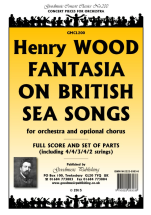Fantasia on British Sea Songs
Buy this item (out of stock)
Product ID: GM1 CL200
By Henry Wood
Publisher:
Goodmusic
Arranger:
2 Flutes (2nd db.piccolo), 2 Oboes, 2 Clarinets in Bb, 2 Bassoons, 2 Horns in F, 2 Trumpets in Bb, 3 Trombones, Tuba (opt.db.Euphonium), Timpani, Percussion (4 players: Triangle, Side Drum, Tenor Drum, Cymbals, Bass Drum, Tambourine, Wood Block, Swan
Series:
Goodmusic Concert Classics
Genre:
Romantic
Line Up:
Symphony Orchestra choir ad.lib.
Duration:
19
Level: 4
Set & Score
This item is out of stock
About this item
The Fantasia
on British Sea Songs was arranged by Sir Henry Wood in 1905 to mark the
centenary of the Battle of Trafalgar. It is a medley of British sea
songs and for many years has been seen as an indispensable item at the
BBC's Last Night of the Proms concert.
The complete work is made up
of nine parts which follow the course of the battle from the point of
view of a British sailor, starting with the call to arms, progressing
through the death of a comrade, thoughts of home, and ending with a
victorious return and the assertion that Britain will continue to 'rule
the waves'. Individual sections can be omitted if required. The fantasia
commences with a series of six naval bugle calls and their responses.
These calls were traditionally used to convey orders on a naval warship.
The
original orchestral scoring for the fantasia required a much larger
orchestra. This new arrangement by Peter Lawson uses a more standard
sized orchestra whilst maintaining the overall effects.
A chorus
[optional] is added throughout as all of the tunes used (except the
bugle calls) started life as sea songs. Four different 48 page vocal
scores are available (none are included in the orchestral pack): SATB -
GM144 SSA - GM145 TTBB - GM146 SA+Men - GM147
The arrangement can also be performed by a choir without an orchestra with only piano accompaniment.
Songlist (9)
- 1. Bugle Calls (Admiral’s Salute, Action, General Assembly, Landing Party, Prepare to Ram, Quick, Double, Extend and Close.)
- 2. The Anchor's Weighed
- 3. The Saucy Arethusa
- 4. Tom Bowling
- 5. Jack's The Lad (Hornpipe) (with optional encore)
- 6. Farewell and Adieu, Ye Spanish LadiesClarinet Cadenza
- 7. Home, Sweet Home
- 8. See, the Conqu'ring Hero Comes
- 9. Rule, Britannia! (A soloist can be used for the verses/choruses)
Instrumentation
2 Flutes (2nd db.piccolo), 2 Oboes, 2 Clarinets in Bb, 2 Bassoons, 2 Horns in F, 2 Trumpets in Bb, 3 Trombones, Tuba (opt.db.Euphonium), Timpani, Percussion (4 players: Triangle, Side Drum, Tenor Drum, Cymbals, Bass Drum, Tambourine, Wood Block, Swanee Whistle), Harp (or Keyboard), Strings (Violin 1, Violin 2, Viola, Cello, Bass 4/4/3/4/2) plus Choir [optional] either SATB, SA+Men, SSA or TTBB
Reviews and rating
No review available, be the first to write one!

Composer
Henry Wood
Sir Henry Joseph Wood was an English conductor best known for his association with London's annual series of promenade concerts, known as the Proms. He conducted them for nearly half a century, introducing hundreds of new works to British audiences. After his death, the concerts were officially renamed in his honour as the "Henry Wood Promenade Concerts", although they continued to be generally referred to as "the Proms".
Born in modest circumstances to parents who encouraged his musical talent, Wood started his career as an organist. During his studies at the Royal Academy of Music, he came under the influence of the voice teacher Manuel Garcia and became his accompanist. After similar work for Richard D'Oyly Carte's opera companies on the works of Arthur Sullivan and others, Wood became the conductor of a small operatic touring company. He was soon engaged by the larger Carl Rosa Opera Company. One notable event in his operatic career was conducting the British premiere of Tchaikovsky's Eugene Onegin in 1892.
From the mid-1890s until his death, Wood focused on concert conducting. He was engaged by the impresario Robert Newman to conduct a series of promenade concerts at the Queen's Hall, offering a mixture of classical and popular music at low prices. The series was successful, and Wood conducted annual promenade series until his death in 1944. By the 1920s, Wood had steered the repertoire entirely to classical music. When the Queen's Hall was destroyed by bombing in 1941, the Proms moved to the Royal Albert Hall.
Wood declined the chief conductorships of the New York Philharmonic and Boston Symphony Orchestras, believing it his duty to serve music in the United Kingdom. In addition to the Proms, he conducted concerts and festivals throughout the country and also trained the student orchestra at the Royal Academy of Music. He had an enormous influence on the musical life of Britain over his long career: he and Newman greatly improved access to classical music, and Wood raised the standard of orchestral playing and nurtured the taste of the public, presenting a vast repertoire of music spanning four centuries.
More info about the composer...



 Click above to view samples
Click above to view samples
